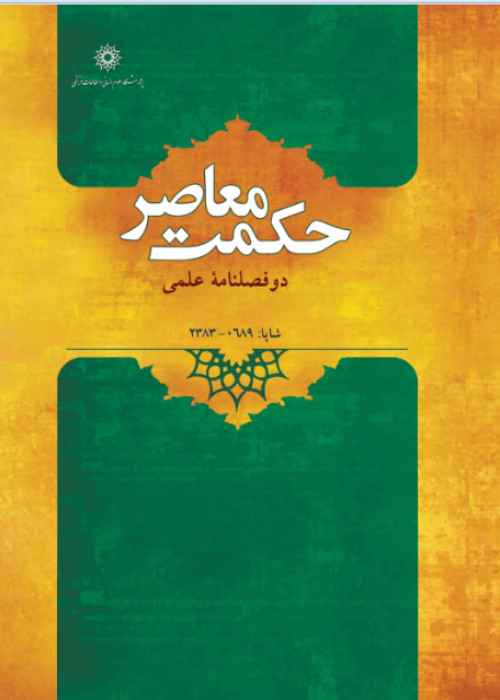The Scope of Knowledge by Presence and Its Application in Accounting for Real and Constructed Perceptions according to Allameh Tabatabai
Knowledge by presence (al-ʿilm al-ḥuḍūrī) is a problem explicitly discussed by Suhrawardī (Shaykh al-Ishrāq). This issue has since become a significant topic in Islamic epistemology. More recently, Allameh Tabatabai has examined this problem and drawn noteworthy conclusions. According to him, knowledge by presence is an existential concept, and is detached from matter. He establishes the existence of such knowledge by appealing to human self-consciousness, which manifests the presence of the existence of our own selves to us. In his view, the criterion for knowledge by presence consists in the real presence of something (the known) to another thing (the knower). Accordingly, he broadens the instances of knowledge by presence to encompass self-knowledge, a cause’s knowledge of its own effects, the effect’s knowledge of its cause, an effect’s knowledge of other effects of its cause, and human knowledge of his own sensory impressions. As for the reduction of knowledge by acquisition (al-ʿilm al-ḥuṣūlī) to knowledge by presence, Allameh Tabatabai believes that each instance of the former is indeed an instance of the latter. In fact, knowledge by acquisition always involves knowledge by presence. It follows that all human knowledge is by presence through and through. This is because it is always an instance of knowledge by presence that turns into an instance of knowledge by acquisition. This transformation is done through the imaginative faculty, which he dubs the faculty of transforming knowledge by presence to knowledge by acquisition. According to Allameh Tabatabai’s view of knowledge by presence and its transformation into knowledge by acquisition, the soul has an effective agential role with respect to epistemic forms or images, obtaining both universal and particular epistemic forms via “unification.” This implies that the process of perception consists in the “strengthening of the detached (immaterial) existence of the world” and its unification with the intellectual level of existence. Another corollary of his view is that, since knowledge is in fact something existential that cannot be subsumed under any of the quiddity-based categories, it cannot be characterized as corresponding or failing to correspond to the reality, whereas knowledge by acquisition can be thus characterized. Furthermore, his view of knowledge by presence implies that knowledge by acquisition is restricted to the material world, since material entities can neither know, nor be known. Of course, material entities involve immaterial dimensions such as change and ignorance in virtue of which knowledge applies to them.
This research was carried out with the library-analytical method.
The main conclusion to be drawn from Allameh Tabatabai’s discussion of the nature of knowledge by presence and its corollaries is that it can be used to determine the ground of distinction between real (ḥaqīqī) and constructed (iʿtibārī) perceptions and how they relate to knowledge by presence. Since an instance of knowledge by presence is involved in any instance of knowledge by acquisition, it follows that when knowledge is divided, what is actually divided is knowledge by presence. That is, there are two types of knowledge by presence: pure knowledge by presence and knowledge presence that can be transformed into knowledge by acquisition. Moreover, given the account of the process through which the former is transformed into the latter and how constructed perceptions emerge from real perceptions with the aid of the estimative (wahmiyya) faculty, it can be concluded that the criterion for the division of perceptions into real and constructed, on Allameh Tabatabai’s account, is the same criterion depicted in the distinction between knowledge by presence and knowledge by acquisition. In other words, just as the mind draws on the activities of the estimative faculty to transform knowledge by presence into knowledge by acquisition for purposes of convenience in ordinary life, it utilizes the same activities to derive constructed perceptions from real perceptions.
According to Allameh Tabatabai, it is knowledge by presence that is transformed into knowledge by acquisition through the activities of the imaginative faculty. The activities of the estimative faculty concerning real entities result in the formation of constructed perceptions. The criterion proposed by him for the division of perceptions into constructed and real is the one depicted in the distinction between knowledge by acquisition and knowledge by presence.
This clarifies the ground of the distinction between real and constructed perceptions, as well as its relationship with knowledge by presence. The ground of real perceptions is pure knowledge by presence, while the ground of constructed perceptions is the type of knowledge by presence that can be transformed into knowledge by acquisition. The distinction between these two kinds of perceptions lies in the difference of the knowledge by presence involved in them.
- حق عضویت دریافتی صرف حمایت از نشریات عضو و نگهداری، تکمیل و توسعه مگیران میشود.
- پرداخت حق اشتراک و دانلود مقالات اجازه بازنشر آن در سایر رسانههای چاپی و دیجیتال را به کاربر نمیدهد.




